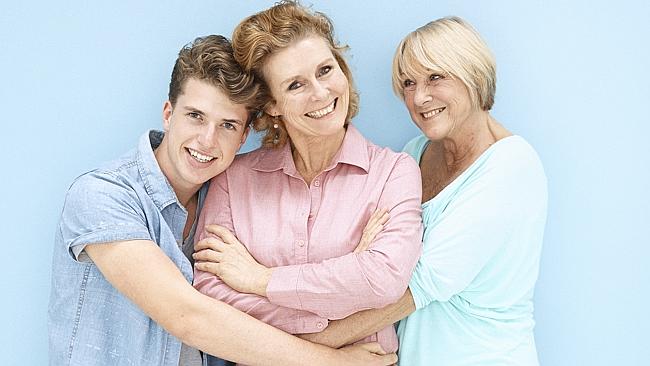
Not unlike an unappreciated middle child, the ‘sandwich generation’ could do with a little more love. (Pic: Supplied) Source: Supplied

WENDY TUOHY Source: Supplied
What’s the use of studies that only do your head in?
When a 10-year study of Australians in live-in heterosexual relationships finds married and de facto men are happier with their situation than the women they live with are, then we want answers. Lots of them.
The latest Household, Income and Labour Dynamics in Australia survey will have many women lying awake staring at the gently snoring dude on the next pillow and maybe even questioning … but am I really happy? Or am I being ripped off by 0.3 per cent?
According to the study of 20,000 people between 2001 and 2012, on a scale of zero to 10, married men in 2012 gave their relationship an 8.5, while women gave it an 8.2. The eight bit sounds dandy, but if marriage is a two-way street why is the grass a little greener on one side?
One of the more interesting findings is that being married improves men’s sense of wellbeing, but doesn’t offer the same boost for women (though neither was it a negative). Women’s happiness tends to diminish with the duration of the marriage, men’s didn’t fade to nearly the same extent.
The study found happiest women were in de facto relationships of less than three years duration, with no dependent kids. They had partners “at least five years younger” than them. They were not “in the labour force” and their partners were in good physical and mental health, though had an education of Year 12 or below.
Blokes are happiest “in the first few years of marriage” with no dependent children and have a wife at least five years younger in good physical and mental health. She has an education of Year 12 or below and doesn’t smoke (ladies are happier if neither smokes).
The unhappiest women are those married between 10 and 19 years with dependent children and a husband five years or more older. They are extroverted and open to new experiences but hubby isn’t and he smokes.
The most miserable blokes are in a de facto relationship of more than 20 years and have dependent children, their partner is open to new experiences but they aren’t and they are conscientious while “she isn’t”.
The study also showed men’s sense of wellbeing and health benefited from being married, while women’s was not affected either positively or negatively by being married. The finding that marriage makes men happier but doesn’t affect women in the same way echoes other international studies.
Even armed with the data from this very large study, you’d have to be a true detective to work out why women are that bit less happy with where they’re at, and why marriage doesn’t really offer the same bliss bonus to the ladies as it does for men.
Or would you?
Looking at the above evidence and taking into consideration other known factors about how Australian households run, I think there are a few giveaways about why long-term domesticity doesn’t always lend quite the same glow to us girls.
One hint is in the fact women are unhappiest in their 40s and 50s — the heavy lifting years of parenting and for many of us also working to help cover family costs. Women currently in this age group in Australia have been dubbed “the sandwich generation” because since they had children later than their own parents they are often managing kids, the household load and also helping look after ageing parents.
In the majority of Australian families the primary burden of childcare is still carried by women (as contemporary research continues to show), and once you hit those middle decades when the kids are at school and you’ve likely returned to work, if you’re also lugging the lion’s share of the family/domestic load it could certainly take the shine off the romance.
The fact many men prefer to marry down in age plays to Australian social convention, but the fact women are happiest if their partner is at least five years younger is new and possibly significant.
Given many younger men are more likely to be vigorous and engaged with stuff like cooking, housework and grocery shopping, and hands-on parenting duties, than older peers who may still consider all of this “women’s work”, it stands to reason the ladies living with the younger guys feel more satisfied.
The moral to the happy gap could just be as simple primary carers doing less of the grunt work in those middle decades, and getting time to give themselves a bit more TLC.
Originally published as Married men are happier than married women
